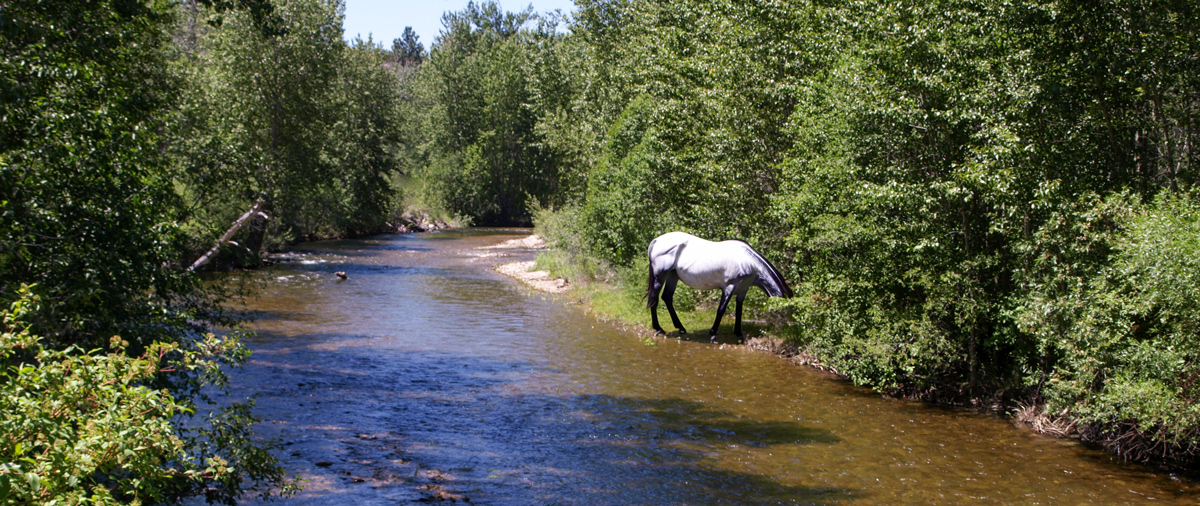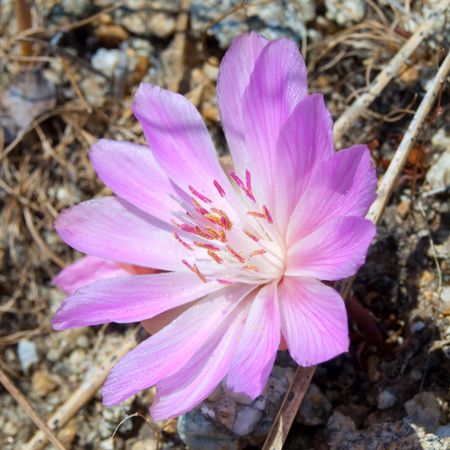The captains describe their plan to divide forces, each taking a different route the Knife River villages. The Nez Perce guides agree to show Lewis the “Road to the Buffalo,” and he prepares several plant specimens—all new to science.
Lolo Creek at Travelers’ Rest
© 1 July 2009 by Kristopher K. Townsend. The horse was added with the aid of artificial intelligence. Permission to use granted under the Creative Commons Attribution-Share Alike 4.0 International license.
The Plan to Divide Forces
Here the party is to be separated; some of us are to go straight across to the falls of the Missouri and some to the head waters of Jefferson river, where we left the canoes. At the falls, we expect to be subdivided, as Capt. Lewis, myself and four or five men, intend to go up Maria’s river, as far as the 50th degree of latitude; and a party to remain at the falls to prepare harness and other things necessary for hauling our canoes and baggage over the portage.— Perhaps Capt. Clarke, who goes up the river here, may also take a party and go down the Riviere Jaune, or Yellow-stone river.
—Patrick Gass
Nez Perce Guides to Leave
those guides expressed a desire to return to their nation and not accompany us further . . . . [We] wished that they would accompy Capt. Lewis on the rout to the falls of Missouri only 2 nights and show him the right road to cross the Mountains. this they agreed to do. we gave a medal of the Small Size to the young man Son to the late Great Chief of the Chopunnish [Nez Perce] Nation who had been remarkably kind to us in every instance, to all the others we tied a bunch of blue ribon about the hair, which pleased them very much.
—William Clark
Gun Repairs
Windsor birst his gun near the muzzle a few days since; this Sheilds [Shields] cut off and I then exchanged it with the Cheif for the one we had given him for conducting us over the mountains. he was much pleased with the exchange and shot his gun several times; he shoots very well for an inexperienced person.
—Meriwether Lewis
Land of Plenty
We Sent out all the hunters very early this morning by 12 OClock they all returned haveing killd. 12 Deer Six of them large fat Bucks, this is like once more returning to the land of liveing a plenty of meat and that very good.
—William Clark
Describing the Prairie Dog
when at rest above ground their position is generally erect on their hinder feet and rump; thus they will generally set and bark at you as you approach them, their note being much that of the little toy dogs
—Meriwether Lewis
Five Plant Specimens
Bitterroot
Lewisia Rediviva
NE Washington, 30 May 2011. © by Kristopher K. Townsend. Permission to use granted under the Creative Commons Attribution-Share Alike 4.0 International license.
Bitterroot
The Indians eat the root of this Near Clark’s R. Jul. 1st 1806
—Meriwether Lewis[1]Lewisia Rediviva. Moulton, ed. Herbarium, specimen 87.
Thin-leaved Clover Specimen
Valley of Clark’s R. Jul. 1st 1806
—Meriwether Lewis[2]Orthocarpus tenuifolius. Moulton, ed. Herbarium, specimen 116.
Bessey’s Crazyweed
Near the head of Clark’s River Jul. [1?] 1806.
—Meriwether Lewis[3]Oxytropis nana var. besseyi. Moulton, ed. Herbarium, specimen 118.
Worm-leaved Stonecrop
Valley of Clarks R. Jul. 1st 1806.
—Meriwether Lewis[4]Sedum stenopetalum. Moulton, ed. Herbarium, specimen 159.
Small-headed
Valley of Clarks R. Jul. 1st 1806.
—Meriwether Lewis[5]Trifolium microcephalum. Moulton, ed. Herbarium, specimen 168.
Weather Diaries
State of the weather at rise
Wind at rise
State of the weather at 4 P. M. Wind at 4 P. M. cloudy after fair N W fair N W a speceis of wild clover with a small leaf just in blume.
—Meriwether Lewis
State of the weather at Sun rise Wind at Sun rise State of the weather at 4 P. M Wind at 4 P M. cloudy after fair N W fair N W a Species of wild Clover in blume
—William Clark[6]To assist the reader of this web page, the date column is omitted and some abbreviations have been spelled out.
Experience the Lewis and Clark Trail
The Lewis and Clark Trail Experience—our sister site at lewisandclark.travel—connects the world to people and places on the Lewis and Clark Trail.
Plan a trip related to July 1, 1806:

Travelers’ Rest is a High Potential Historic Site along the Lewis and Clark National Historic Trail managed by the U.S. National Park Service. The site, managed by the Travelers’ Rest Preservation & Heritage Association, is a Montana State Park with interpretive trail and a visitor center.
Notes
| ↑1 | Lewisia Rediviva. Moulton, ed. Herbarium, specimen 87. |
|---|---|
| ↑2 | Orthocarpus tenuifolius. Moulton, ed. Herbarium, specimen 116. |
| ↑3 | Oxytropis nana var. besseyi. Moulton, ed. Herbarium, specimen 118. |
| ↑4 | Sedum stenopetalum. Moulton, ed. Herbarium, specimen 159. |
| ↑5 | Trifolium microcephalum. Moulton, ed. Herbarium, specimen 168. |
| ↑6 | To assist the reader of this web page, the date column is omitted and some abbreviations have been spelled out. |




